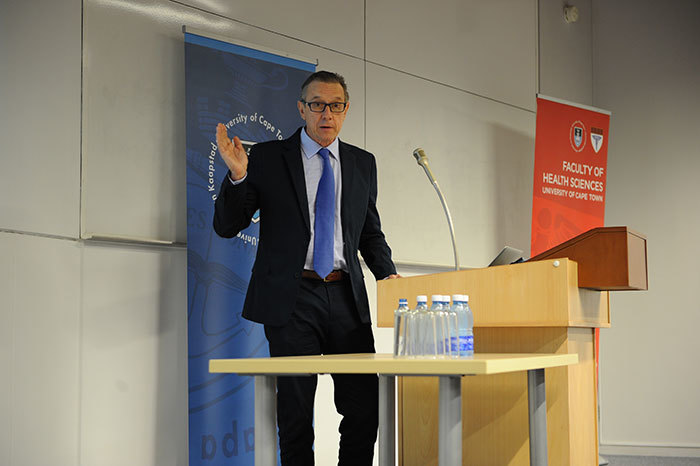The gift of modern neurosurgery
31 March 2015 | Story by Newsroom
When UCT alumnus David Barnes first lost his sense of smell, he had little idea of the life journey on which it would take him – culminating in his R25-million donation to the Neurosciences Initiative at UCT and Groote Schuur Hospital.
UCT alumnus David Barnes first realised he had lost his sense of smell when he went to buy perfume for his wife, Ursel. It took much encouragement from his wife and a few more worrying symptoms, such as hearing loss, before Barnes went to visit a doctor. He was referred to an ear, nose and throat specialist who sent him to a neurologist. Brain scans revealed that Barnes had a tumour, about the size of a small cricket ball, in the front of his brain. After researching various treatment options, the family opted for minimally invasive brain surgery. With the aid of an endoscope, the tumour was removed through a small incision in his eyebrow that required two sutures and four days in hospital – a triumph of modern neurosurgery.
Brain tumours are not the only neurological threat facing humankind. According to the World Health Organisation, 150-million people worldwide suffer from depression; 90 million are affected by alcohol abuse; 50 million suffer from epilepsy and a growing number are affected by diseases of aging and neurological degenerative disorders.
It was in recognition of this, and out of gratitude for getting his life back, that Barnes donated R25 million to the Neurosciences Initiative at UCT and Groote Schuur Hospital, the first in Africa.The Neurosciences Initiative was launched on 23 March 2015 and will bring together clinicians and researchers from a wide range of specialities to foster collaboration in the treatment of a number of neurological disorders, including strokes, central nervous system infections and trauma, among others.
"Up to now," says UCT's Vice-Chancellor Dr Max Price, "the vast majority of research into the brain and the neurological system has focused on the Westernised world: populations that are largely educated, industrialised, democratic and with the economic resources to seek diagnosis and treatment of neurological disorders. Yet the majority of people who suffer from common mental and neurological disorders live in low- and middle-income countries. This points to a critical shortfall in research that is relevant to these populations: more than 95% of research publications in the area of psychiatry, for example, are from high-income countries."
The Neurosciences Initiative is intended to make great strides towards remedying this. "It will focus both on increased access to care and treatment as well as transforming research and teaching in the neurosciences in Africa," says Professor Graham Fieggen, head of neurosurgery and project leader of the Neurosciences Initiative. "It will draw together an array of expertise in neurosurgery, neurology, neuropsychology, neuropsychiatry and neuroimaging. It will also partner with other disciplines such as engineering, the arts and disability studies, creating a facility where patients can access the highest quality of care and the most cutting-edge treatment options."
|
The launch of the Neurosciences Initiative coincided with a visit by the University of Oxford – fortuitously, given that one of the strongest collaborations already taking place within the field of neurosciences is with researchers at the University of Oxford. Professor of neuroscience and co-director of the Oxford Centre for Neuromuscular Science Matthew Wood is not just an honorary professor at UCT, but also a UCT alumnus – and will be working with Prof Graham Fieggen to strengthen existing and develop new collaborations between the two universities in the neurosciences. |
Story by Natalie Simon.
 This work is licensed under a Creative Commons Attribution-NoDerivatives 4.0 International License.
This work is licensed under a Creative Commons Attribution-NoDerivatives 4.0 International License.
Please view the republishing articles page for more information.










